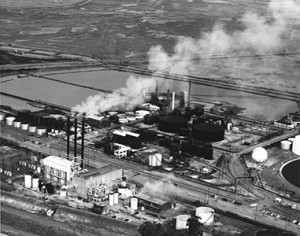
The War Labor Board was concerned in 1942 about a possible war-time strike by Ron Weakley and his followers at PG&E’s Avon Plant, a source of steam and electricity to oil refineries in the area. IBEW 1245 Archive
When Japan bombed Pearl Harbor, the UWOC rescinded its PG&E strike vote. In April of 1942 the NLRB ordered a representation election in the East Bay. Employees chose UWOC over the IBEW by a 4-1 margin. The UWOC immediately asked the company to open negotiations for a contract. General Manager Paul M. Downing refused.
The U.S. Department of Labor asked PG&E to let the War Labor Board take jurisdiction of the dispute. Downing refused. The UWOC threatened to strike. The War Labor Board, worried that a strike would curtail vital production at three East Bay oil refineries, ordered PG&E to bargain. Downing ignored the order. A mediation panel finally imposed a settlement on December 30, 1942—the first labor agreement obtained by PG&E employees in over 20 years.
Weakley’s success in the East Bay was like a foot on the accelerator. Throughout PG&E, CIO and IBEW activists competed in union elections. Despite their inability to forge a united front, the two unions got virtually all of PG&E organized during 1942 and 1943. UWOC locals prevailed in the Bay Area, while IBEW 1245 prevailed in outlying areas.
Under the watchful eye of the War Labor Board, PG&E agreed to contracts that provided modest gains for both Physical and Clerical workers. These gains included a cost-of-living adjustment, reduction of the probationary period, a wage premium for being “on call,” a shift differential (premium), and a halt to PG&E’s nefarious practice of raiding retirement insurance benefits that employees had paid for out of their own pockets.